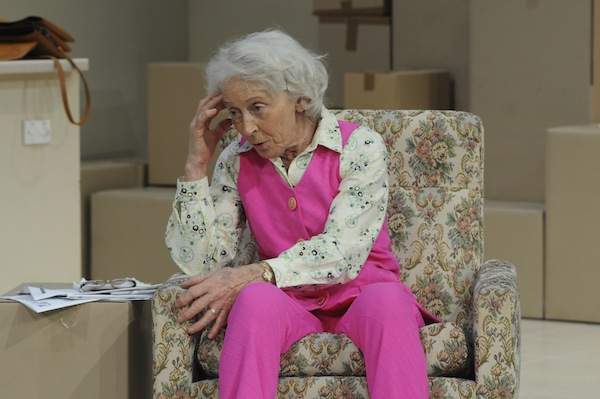Gwen in Purgatory
Playwright Tommy Murphy's much-anticipated follow-up to [i]Holding the Man[/i] and [i]Saturn's Return[/i], [i]Gwen in Purgatory[/i] was directed and guided to fruition by Neil Armfield at Company B. The result is an immaculate production of a finely tuned script. At its centre is 90-year-old Gwen Houlihan, lifelong resident of Queanbeyan, cloistered in her new digs and caught in a web of technologies that have kept moving faster as she has slowed down to a shuffle. Literally. Her phones are ringing and she just can't reach them in time. And the arrival of her children and grandchildren isn't the balm you'd hope.
Overview
When you enter she's already there, sitting small and restless amid the expanse of cool, eggshell-white tile, beige packing boxes and gleaming appliances. This room is a model of edge-of-town housing developments; an arena for a single-act battle of deeds, words and undercurrents; and purgatory for one woman at the twilight of her years.
Playwright Tommy Murphy's much-anticipated follow-up to Holding the Man and Saturn's Return, Gwen in Purgatory was developed under the Philip Parsons Award and directed and guided to fruition by Neil Armfield at Company B. The result is an immaculate production of a finely tuned script. At its centre is 90-year-old Gwen Houlihan (Melissa Jaffer), lifelong resident of Queanbeyan, cloistered in her new digs and caught in a web of technologies that have kept moving faster as she has slowed down to a shuffle. Literally. Her phones are ringing and she just can't reach them in time.
It's funny, but you don't want to laugh too hard; as well as being absurd, Gwen's situation is all too real, as is her pain. And the staggered arrival of her surviving children and grandchildren Daniel (Nathaniel Dean), Peg (Sue Ingleton) and Laurie (Grant Dodwell) isn't the balm you'd hope. They each bring their family-spun neuroses and mixed intentions as they dodge their looming duty of care and fill the room with tension. In the background, ingeniously, floats Father Ezekiel (Pacharo Mzembe), a young, Nigerian priest plugging Australia's ecclesiastic skills shortage. He has come to tend to his congregant but spends most of the play observing the interaction of the Houlihans like us in the audience but saintly.
A number of things raise this way above your average Aussie cringe-comedy. Foremost is a script in which there is verbosity yet no syllable of excess; every word is meticulously plotted, resonates and interlocks in surprising ways and comes back to bite its characters. And what characters: written with warmth, rendered with devotion, they evoke empathy even at their nastiest. It's wholesome, somehow, so you can probably take your actual grandma although you may think twice about leaving her at the end of the evening.
Image by Heidrun Lohr.





